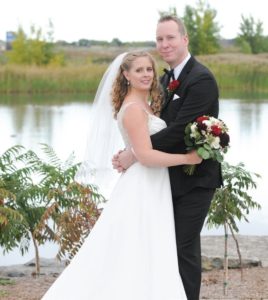Face to Face with Acacia French, Liaison Nurse at the MUHC
 As a liaison nurse at the Lachine Hospital, Acacia French ensures continuity of patient care by being the link between the hospital and the community. A dedicated problem-solver, she works closely with partner organizations and interdisciplinary teams to organize the necessary services that a patient may need when they return home. It is this insight into patient care and a sympathetic understanding of their needs that inspired her to action during a recent life event. When Acacia and her sweetheart, Todd Browne, tied the knot this fall, they decided to do something different for their wedding favors. Instead of leaving bonbonnières or souvenirs on the table, they honored their guests’ presence at the wedding by making a donation to the Lachine Hospital Foundation.
As a liaison nurse at the Lachine Hospital, Acacia French ensures continuity of patient care by being the link between the hospital and the community. A dedicated problem-solver, she works closely with partner organizations and interdisciplinary teams to organize the necessary services that a patient may need when they return home. It is this insight into patient care and a sympathetic understanding of their needs that inspired her to action during a recent life event. When Acacia and her sweetheart, Todd Browne, tied the knot this fall, they decided to do something different for their wedding favors. Instead of leaving bonbonnières or souvenirs on the table, they honored their guests’ presence at the wedding by making a donation to the Lachine Hospital Foundation.
What inspired you to donate to the Lachine Hospital Foundation?
Prior to joining the liaison float team at the Lachine Hospital, I had no palliative care experience. Learning how to help patients and families in palliative care was a very big challenge for me. These patients are on their last stretch of life and I found it hard to see families grieving, to see patients deteriorate. Experiencing this proved to be very difficult and emotional at times. I empathized with families, having to see their loved ones in that condition.
Palliative care helps facilitate patients and their families through the stages of death. It is not a place where people go to be given up on to die, which is a common stigma. The care team ensures that patients are comfortable and at peace.
Some of the ways they do this is by medication and medical management, but there are other ways this can be done as well, by having things like massages, music sessions, animal visits, etc. Unfortunately, these types of services aren’t seen as essential in medical terms so they aren’t covered by hospital funding.
The Lachine Hospital Foundation covers these services and to me, they are just as essential as medication for some patients. I once saw a patient who had a very decreased level of consciousness until his cat was brought in to visit. When his cat was there, he was sitting right up in bed talking and petting him with the biggest smile on his face. He died a few days later. This goes to show that this man really just needed to see his cat and, judging by his face that day, he wasn’t focused on thinking about dying—he was actually really living!
If donations are what the palliative care unit needs to keep these services going, then I wanted to help be a part of that by donating, by helping the people that need it now.
How would you hope that this money is used?
I would like to see the money used towards the services mentioned above that can ease the patient experience or for palliative patients at home who need extra money to acquire services that would make them more comfortable. I would even like to see the money go towards family members, if needed. For example, if a family member doesn’t drive and would like to visit but has limited income, I would like to see the money go towards their transportation. Or if someone has to take time off work to be with their dying loved one but is stressed about paying bills, we should help them with this. Then they could live through the last days of the patient’s life focused on their loved one and not distracted by other factors.
Everyone is different and has different needs and expecta¬tions, so it is hard to pinpoint one thing that I think the money should go towards. If there is any way that the money could facilitate a patient or a family member through this process, I think they deserve it.
How did you tell your wedding guests and what was their reaction?
My husband and I announced that we would be making the donation on menu cards and then again in a speech we gave. I spoke about my experience and how the Lachine Hospital Foundation was an organization that had made a life-changing impression on me and that really could use the money. We also encouraged the guests to donate. Tania Di Tota, the palliative care oncology pivot nurse, was at my wedding; she is a colleague and good friend, and a big part of my experience and outlook on palliative care. Tania has been working really hard with the unit and Foundation to get extra funding for these patients and their families—seeing her determination is really inspiring. I am glad that this initiative helped to raise awareness about palliative care.
Our donation was just a small piece of what that unit needs and deserves. Here is to hoping that one-day funding is the last of our worries.


